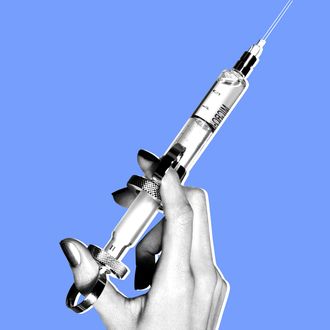
Doctor’s visits are particularly unfun when you’re terrified of needles, as staying disease-free has long meant getting stuck with the pointy end of a sharp object. But, as NBCNews.com’s Maggie Fox explains in a short video posted today, there is some hope on the horizon for needle-phobes.
Already, there’s a flu vaccine you can squirt up your nose, and the polio vaccine is administered orally. Researchers are also working on patches that deliver vaccinations in an easy-to-use, needle-free way, and someday soon, you might even be able to ingest vaccines by eating foods like bananas or rice, Fox explains.
Up to 10 percent of the population may experience a fear of needles, but in a paper published earlier this year in the British Journal of Anesthesia, clinical psychologist Kate Jenkins argues that the phobia is often too quickly dismissed by health professionals. After all, nobody likes needles. But Jenkins writes that she has encountered patients who have refused potentially life-saving treatment because of their intense fear of needles, including an expectant mother who, at 35 weeks pregnant, had so far declined any and all blood tests, potentially putting herself and her baby at risk.
For now, an entirely needle-free medical experience is but a wonderful dream, but there are some ways to cope. Jenkins’s advice is aimed at medical professionals, but there are two useful takeaways for the rest of us.
First and most important, don’t forget to breathe, slowly and deeply. It’s obvious-sounding advice, but Jenkins writes that it’s the simplest way to alleviate physical symptoms of anxiety, like an increased heart rate, that can be misinterpreted as, I’m about to faint!
Second, for the truly terrified, it might be worth seeking help. Behavioral therapy programs designed to help patients get over their fear of needles have seen some success, including a six-session exposure therapy plan designed for multiple sclerosis patients who need to self-inject.
But, seriously, get on those needle-free vaccines, scientists. All this talk of injections is enough to make even the mildly needle-phobic squirm.




